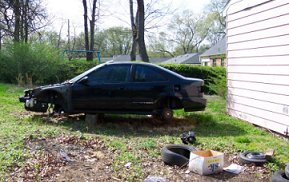
A land bank is a governmental or nongovernmental nonprofit entity established, at least in part, to assemble, temporarily manage, and dispose of vacant land for the purpose of stabilizing neighborhoods and encouraging re-use or redevelopment of urban property.
For the purposes of the HUD Neighborhood Stabilization Program, a land bank will operate in a specific, defined geographic area. It will purchase properties that have been abandoned or foreclosed upon and maintain, assemble, facilitate redevelopment of, market, and dispose of the land-banked properties. If the land bank is a governmental entity, it may also maintain abandoned or foreclosed property that it does not own, provided it charges the owner of the property the full cost of the service or places a lien on the property for the full cost of the service.
Eligible Uses (Housing and Economic Recovery Act)
- Establish financing mechanisms for purchase and redevelopment of foreclosed upon homes and residential properties, including such mechanisms as soft-seconds, loan loss reserves, and shared-equity loans for low- and moderate- income homebuyers
- Purchase and rehabilitate homes and residential properties that have been abandoned or foreclosed upon, in order to sell, rent, or redevelop such homes and properties
- Establish land banks for homes that have been foreclosed upon
- Demolish blighted structures
- Redevelop demolished or vacant properties
Why Have Land Banks?

Vacant properties can be costly and dangerous, reducing surrounding home values and
spreading blight. These properties remain underutilized for a variety of reasons including a
weak market, complicated title issues, and high redevelopment or demolition costs. One
successful strategy to combat these problems is the development of a land bank. A variety of
organizational structures may be employed (not necessarily requiring legislation) for entities
that are generically called land banks.
 Print
Print Email
Email







